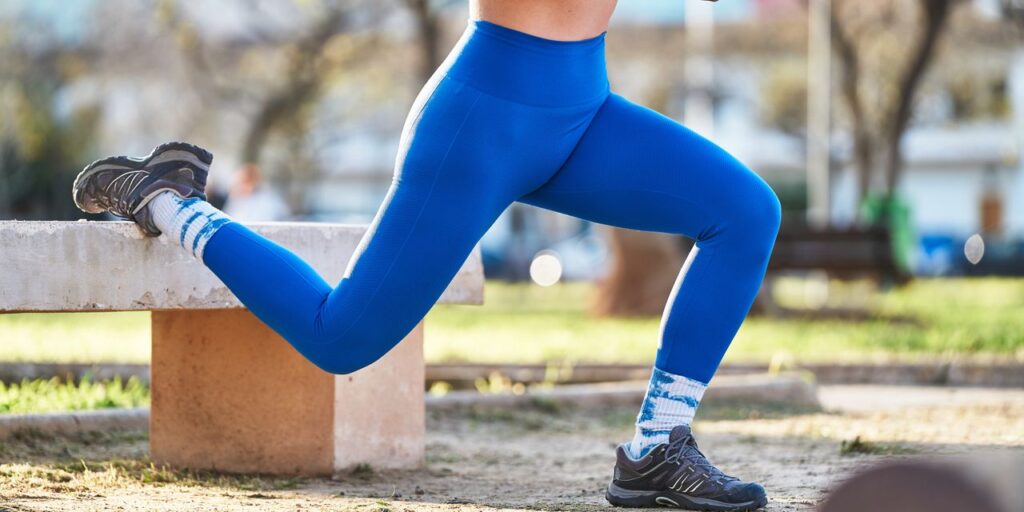A similar notion is at play with aerobic workouts like runs, bike rides, or rowing machine sessions, where you’re really pushing the pace and skyrocketing your heart rate. This is because sleep deprivation takes a toll on your cardiovascular system, compromising its functioning. So placing even more stress on it with intense exercise can increase your chances of raising your blood pressure and jacking up your heart rate to abnormally high levels, Dr. Durmer says. “When people are sleep deprived, things like arrhythmias (abnormal heart rhythms) are more common,” he explains. This is something people with pre-existing health conditions should know about, Dr. Durmer says, adding that it’s less of a concern for folks without prior medical history. That said, while it’d be rare for otherwise healthy folks to have a fatal arrhythmia during sleep-deprived aerobic exercise, Dr. Durmer says, it’s still wise to shelf that type of high-intensity work until you’re better rested.
Health concerns aside, research shows sleep deprivation can ramp up the rate of perceived exertion of your exercise session. Basically, it can make it feel like you’re working a lot harder to complete your regular workout, which is yet another reason you may not want to opt for a super-tough session when you’re short on slumber.
But some workouts can make you feel better when your sleep sucked.
If heavy weightlifting and intense interval workouts are off the table when you’re suffering from less than ideal sleep, what should you do instead?
The short answer: Physical activities that are low-intensity and not super taxing on your body (or your mind). This can look like resistance training with light weights (or just your bodyweight, say, like a full-body circuit routine). Or, it could be running, cycling, rowing, or swimming, as long as the effort keeps your heart rate close to your aerobic threshold (which is typically about 60 to 70% of your maximum heart rate) and not above. Really anything that gets you moving but isn’t overly taxing on your muscles or heart. As for timing and duration, Dr. Durmer suggests following your usual routine, but adjusting the intensity so you’re not pushing above that aerobic zone and capping the duration to 30 to 45 minutes. These tweaks may help reduce your injury risk while combatting the ill effects of sleep deprivation on your body, he explains.
By choosing gentler forms of exercise, you can get the benefits of building up adenosine—thus upping your chances of sleeping well the following night—without posing as much risk to your neuromuscular and cardiovascular systems. What’s more, making it a point to workout after bad sleep can give you that acute jolt of energy and help you feel more awake than you would otherwise. “Mood and energy levels can be enhanced by a workout after sleep deprivation, especially when combined with morning sunlight,” Dr. Durmer says.
One thing: The above recommendations are for people with an established workout routine. If you’re someone who doesn’t regularly hit the gym, but you’ve had a bad night’s sleep and think invigorating exercise may provide the boost you need to get through the day, Dr. Durmer suggests reconsidering that approach. That’s because most of the time when people are sleep deprived, they are missing out on REM (rapid eye movement) sleep, a stage of slumber that’s really important for learning new skills, Dr. Durmer says. So it’s not ideal to start a new exercise routine when your baseline for this is hampered. Instead, just go for that morning stroll in the sunlight and save the new workout program for a day when you are better rested.
There’s one important caveat to choosing a workout after bad sleep, though.
Of course, there may be days when you’re coming off of sleep that was truly horrendous—maybe you literally only logged a couple hours, or you were up every 45 minutes throughout the night. In these cases, a workout might just feel unfeasible. And that’s okay.
One thing you can do, though: Dr. Durmer suggests taking a 30 to 60-minute morning stroll in the natural sunlight, which will keep your circadian rhythm on track and help you generally just feel a little better. If that feels impossible given your bone-deep fatigue, just walk for 15 minutes and then spend another 15 minutes sitting on a park bench, soaking up the sunlight, he suggests. Again, this will help your circadian rhythm stay regulated so you have a better chance of sleeping well the next night.
Related:
Get more of SELF’s great service journalism delivered right to your inbox.


